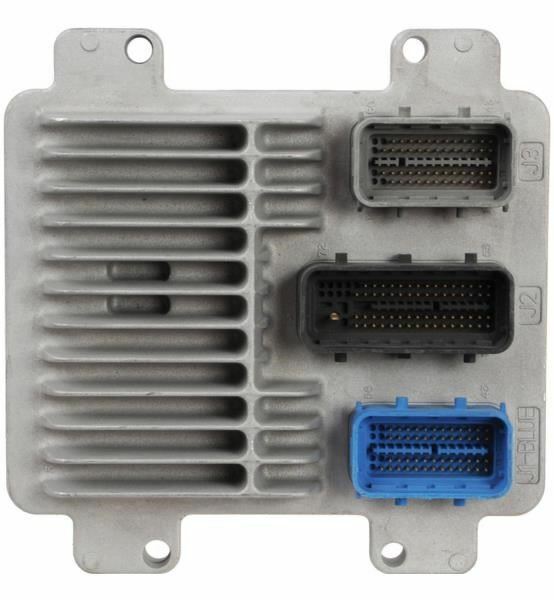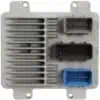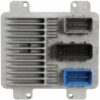Get Back on the Road with Confidence and Reliability
Is your Buick or Pontiac suffering from baffling electrical gremlins? A persistent Check Engine Light, rough idling, stalling, or a frustrating no-start condition can quickly turn your daily drive into a source of stress. These are often hallmark signs of a failing Engine Control Module (PCM). Instead of guessing with a used part from a salvage yard, take control of the repair with a solution designed for a first-time fix. This PCM is professionally programmed with the latest GM software updates, precisely matched to your vehicle’s specific VIN, restoring factory performance and efficiency.
Warning Signs and How to Overcome Them
A failing PCM can manifest in numerous ways, often mimicking other sensor failures. If you’re experiencing any of the following, this module is the definitive solution:
- ✔ Check Engine Light: Specifically for internal module faults like DTC P0601, P0602, or P0606.
- ✔ No-Start or Hard-Start: The engine cranks but refuses to fire up, or takes an excessively long time to start.
- ✔ Erratic Engine Behavior: Unexplained stalling, rough running, poor acceleration, or a noticeable drop in fuel economy.
- ✔ Communication Errors: Your scan tool can’t communicate with the PCM, or you have U-series communication codes.
- ✔ Transmission Problems: Harsh or delayed shifting, as the PCM plays a critical role in transmission control.
Why Choose Our Programmed 2006-2009 LaCrosse PCM?
This isn’t just a replacement part; it’s a restoration of your vehicle’s core operational integrity. By providing us with your VIN, you receive a module that is truly ready for your vehicle. We handle the complex programming, loading the most current GM-certified calibrations to correct common factory issues and optimize performance. This critical step ensures all components in your vehicle communicate correctly, eliminating the need for an expensive trip to the dealership for flashing. You get a reliable, effective repair that brings back the smooth, dependable drive you remember.
“A customer’s 2007 Grand Prix had an intermittent stalling issue that two other shops couldn’t solve. They had replaced sensors and checked wiring for weeks. The problem was a heat-sensitive fault inside the original PCM. Installing one of our VIN-programmed modules didn’t just fix the stall—it smoothed out the idle and even improved the shift quality. The customer called a week later just to say he felt like he had his old car back. That’s the peace of mind a proper repair provides.”
– A Word From Our Lead Technician
Guided Installation to Restore Peace of Mind
Replacing your PCM is a straightforward process you can handle with basic tools. Follow these steps for a successful installation:
- Safety First: Disconnect the negative terminal from your vehicle’s battery and wait at least 15 minutes to allow all systems to discharge fully.
- Locate the Module: On these GM models, the PCM is conveniently located in the lower part of the air cleaner box assembly. You will need to remove the air filter cover and filter to access it.
- Disconnect Wiring: Carefully release the locking tabs on the electrical connectors and gently pull them straight out from the module. Never force them. Inspect the connectors for any corrosion or damage.
- Remove the Old PCM: Unbolt the mounting hardware holding the module in place and remove it from the vehicle.
- Install the New Module: Seat your new, pre-programmed PCM in the mounting bracket and secure it. Reconnect the electrical harnesses, ensuring they click firmly into place.
- Reassemble & Reconnect: Reinstall the air filter and cover. Reconnect the negative battery terminal.
- Perform Relearn Procedure: While the module is programmed, your vehicle will likely require a simple security relearn (Passlock/Passkey) and a Crankshaft Variation (CASE) relearn. These can often be done without a high-end scan tool. The security relearn typically involves cycling the key, and the CASE relearn may require a scan tool for best results to ensure optimal engine timing and misfire detection.
Tailored Fit for Your Ride
This module is a direct-fit replacement for the following vehicles equipped with the 3.8L V6 engine:
- 2006-2009 Buick LaCrosse
- 2006-2009 Buick Allure
- 2006-2008 Buick Lucerne
- 2006-2008 Pontiac Grand Prix
Part Number Cross-Reference: 12600930, 12616866, 12619810, 12509307
Frequently Asked Questions
What exactly is VIN programming?
VIN programming is the process of loading your vehicle’s specific software and calibrations onto the PCM. This includes information about your engine, transmission, and factory-installed options. It ensures the module works seamlessly with your car’s existing systems, just like the original one did from the factory.
Do I need to do anything after installation?
Yes. After installing the module and reconnecting the battery, you will need to perform a security relearn procedure, which allows the PCM to recognize your vehicle’s anti-theft system. A Crankshaft Variation (CASE) relearn is also highly recommended to prevent a check engine light for misfires. Many local repair shops can perform the CASE relearn quickly if you don’t have the tool.
How do I provide my VIN?
After you complete your purchase, simply send us a message with your 17-digit Vehicle Identification Number (VIN). We cannot ship your part until we receive this information, as the programming is essential for the part to function.
Is this part truly ‘plug and play’?
Because we pre-program it to your VIN, it is as close to ‘plug and play’ as possible. It eliminates the most difficult step—flashing the module. However, the post-installation relearn procedures mentioned above are a necessary final step for your vehicle’s systems to sync correctly.
Will this fix my car’s specific problem?
This module is a direct solution for issues caused by a failed PCM, such as internal processor faults (P0601-P0606), communication failures, and erratic engine operation. While it solves many problems, always ensure your vehicle has been properly diagnosed, as other failing sensors can sometimes mimic PCM symptoms.


